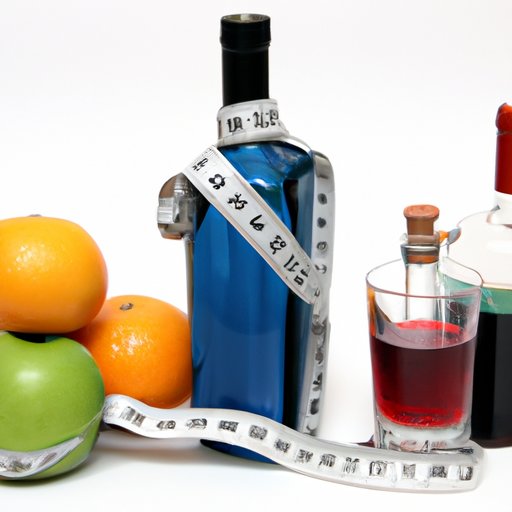
Introduction
When it comes to weight loss, most people focus on diet and exercise as the primary ways to reach their goals. However, one factor that often goes overlooked is alcohol consumption. While it may not seem like a big deal to have a few drinks now and then, alcohol can actually have a significant impact on weight loss efforts. In this article, we’ll explore the unexpected consequences of alcohol on weight loss and provide tips for balancing alcohol intake with your weight loss goals.
The Unexpected Consequences of Alcohol on Weight Loss
Alcohol affects the body in various ways that can make weight loss more difficult. First, alcohol is high in calories, with a standard drink containing around 100-150 calories. While this may not seem like much, it can quickly add up, especially if you’re consuming multiple drinks in one sitting. Additionally, alcohol can cause you to crave high-calorie, high-carbohydrate foods, which can also contribute to weight gain.
Another way alcohol can counteract weight loss efforts is by affecting nutrient absorption and metabolism. When you drink alcohol, your liver prioritizes breaking down the alcohol over other nutrients, such as carbohydrates and proteins. This can lead to decreased absorption of these important nutrients, making it harder for your body to function properly and maintain a healthy weight.
Is Alcohol Sabotaging Your Weight Loss Goals? Understanding its Effects
Alcohol can have a significant impact on weight loss in several ways. One of the primary ways alcohol affects weight loss is by slowing down the metabolic process. When you drink alcohol, your body must break down and metabolize the alcohol before it can burn any calories from food or drink consumed. This means that your metabolism slows down, making it harder to burn calories and lose weight.
Additionally, alcohol consumption can lead to insulin resistance, which can also impact weight loss efforts. Insulin resistance occurs when your body becomes less sensitive to insulin, a hormone that regulates blood sugar levels. This can lead to an increase in blood sugar and insulin levels, which can cause your body to store more fat and make it harder to lose weight.
Calories, Cravings, and Consumption: How Alcohol Affects Weight Loss
As mentioned earlier, alcohol is high in calories, and consuming several drinks in one sitting can quickly add up. In addition to the direct calorie intake from alcohol, alcohol can also increase your calorie intake indirectly. When you drink alcohol, you’re more likely to give in to cravings and eat high-calorie, high-carbohydrate foods that can contribute to weight gain.
Alcohol consumption can also intensify cravings for unhealthy foods. This is because alcohol affects the part of the brain that controls feelings of hunger and fullness, leading to increased cravings for greasy, salty, or sugary foods. This can make it harder to resist unhealthy food choices, even if you’re actively trying to lose weight.
The Connection between Alcohol, Metabolism, and Weight Loss
As mentioned earlier, alcohol consumption can slow down the metabolic process and make it harder to burn calories and lose weight. This is because your liver must prioritize breaking down the alcohol, which takes time and energy away from other metabolic processes. Additionally, excessive alcohol consumption can lead to various health problems that can contribute to weight gain, such as liver disease and hormonal imbalances.
Excessive alcohol consumption can also lead to decreased muscle mass, which can impact metabolism. Your muscles are responsible for burning calories, so if you have less muscle mass, your metabolism will slow down, making it harder to lose weight.
Sipping towards Success: Tips to Balance Alcohol Intake and Weight Loss
If you’re trying to lose weight but still want to enjoy the occasional drink, there are ways to balance alcohol intake with your weight loss goals. One tip is to choose lower-calorie drinks, such as light beer or wine spritzers, instead of high-calorie cocktails or beer. Additionally, you can moderate your intake by alternating alcoholic drinks with water or a low-calorie beverage.
Another way to balance alcohol intake and weight loss is to plan ahead. If you know you’re going out for a night of drinking, prepare ahead of time by eating a healthy, balanced meal beforehand, so you’re less likely to give in to unhealthy food cravings. Additionally, you can plan to have a healthier meal the next day to balance out the extra calories consumed the night before.
Conclusion
While alcohol consumption may not be the first thing you think of when it comes to weight loss, it can have a significant impact on your efforts. By understanding how alcohol affects weight loss and implementing strategies to moderate your intake, you can still enjoy a drink or two without sabotaging your weight loss success.
Call to Action: If you’re trying to lose weight, consider reducing your alcohol intake or implementing strategies to balance your alcohol consumption with your weight loss goals. By making small changes in your drinking habits, you can see significant improvements in your overall health and well-being.





